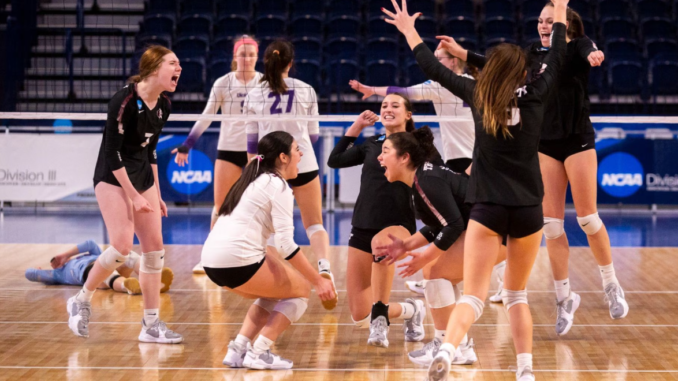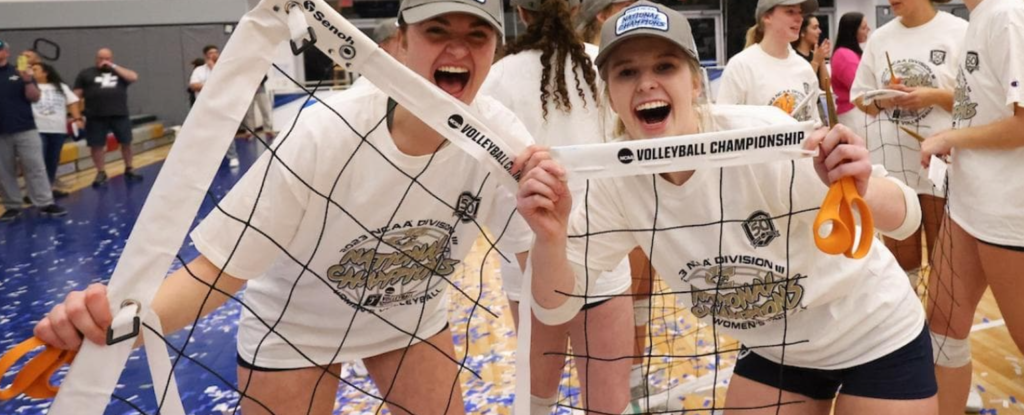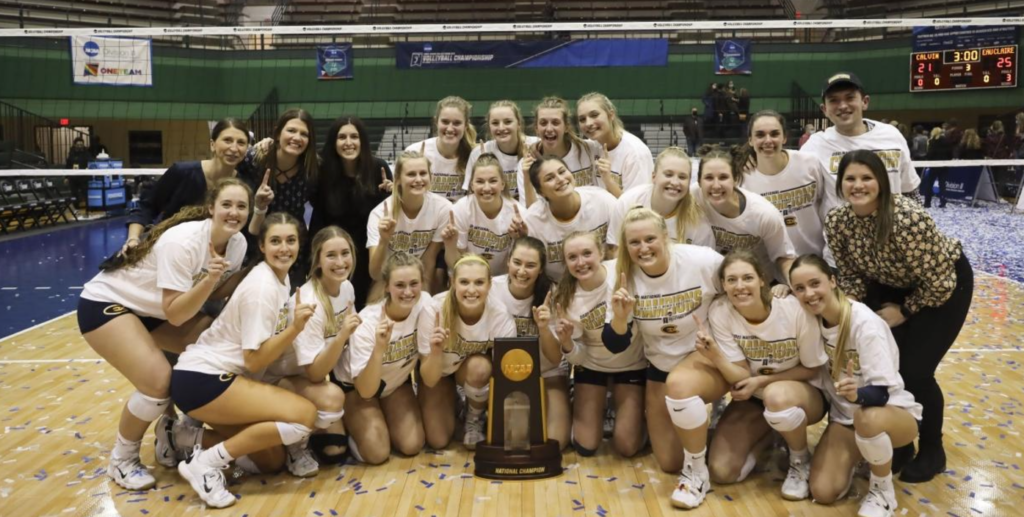
NCAA Division 3 Volleyball
NCAA Division 3 (D3) volleyball represents the essence of collegiate sports, blending athletic competition with academic rigour and a focus on personal development. Unlike its Division 1 and 2 counterparts, D3 athletics are characterized by the absence of athletic scholarships, creating a unique atmosphere where student-athletes compete for the love of the game while pursuing their academic and personal goals. In this article, we explore the world of NCAA Division 3 volleyball, delving into its structure, opportunities, challenges, and impact on players’ lives.
1. Overview of NCAA Division 3 Volleyball
The NCAA (National Collegiate Athletic Association) governs college sports in the United States and classifies institutions into three divisions based on factors such as size, funding, and athletic philosophy. Division 3 is the largest, encompassing over 440 institutions nationwide.
Key Characteristics of D3 Volleyball
- No Athletic Scholarships: While athletic scholarships are not offered, student-athletes often receive financial aid based on academic performance, leadership qualities, and need.
- Balanced Experience: Division 3 emphasizes a well-rounded college experience, allowing students to excel academically, athletically, and socially.
- Competitive Spirit: Despite the absence of scholarships, D3 volleyball maintains a high level of competition, with teams vying for conference titles and a spot in the NCAA tournament.
- Diverse Programs: D3 volleyball programs vary widely in size, facilities, and resources, making it accessible to a broad range of athletes.

See Also; cnu volleyball
2. Structure of NCAA Division 3 Volleyball
2.1 Season Format
The D3 volleyball season is divided into three phases:
- Preseason: Teams begin training in August, focusing on building team chemistry, refining techniques, and implementing strategies.
- Regular Season: The season typically starts in early September and runs through late October. Teams compete in conference and non-conference matches.
- Postseason: The NCAA D3 volleyball championship begins in November. Teams earn spots through conference championships or at-large bids.
2.2 Conferences
Division 3 volleyball features numerous conferences, each with its unique identity. Some prominent D3 conferences include:
- New England Women’s and Men’s Athletic Conference (NEWMAC): Known for its academic rigor and competitive volleyball programs.
- American Rivers Conference (ARC): Featuring strong Midwest teams with a history of success.
- NESCAC (New England Small College Athletic Conference): Highly respected for both athletics and academics.
2.3 NCAA Tournament
The NCAA Division 3 Volleyball Championship is the pinnacle of the season, bringing together 64 teams to compete for the national title. The tournament includes:
- Automatic Qualifiers: Teams that win their conference championships.
- At-Large Bids: Awarded to high-performing teams not winning their conferences.
- Regional Rounds: Teams compete within geographic regions before advancing to the national quarterfinals, semifinals, and finals.
See Also; lincoln lutheran volleyball
3. Opportunities for D3 Volleyball Players
3.1 Academic Excellence
D3 schools prioritize academics, ensuring student-athletes can fully engage in their studies. Flexible class schedules, access to professors, and academic support are hallmarks of D3 institutions.
3.2 Leadership Development
D3 volleyball fosters leadership skills both on and off the court. Many athletes serve as team captains, participate in student government, or lead community service projects.
3.3 Competitive Environment
Despite the absence of scholarships, D3 volleyball is fiercely competitive. Athletes are driven by passion, resulting in intense matches and high-quality play.
3.4 Career Preparation
D3 volleyball allows athletes to balance athletics with internships, research, and other career-focused opportunities. This prepares them for life beyond college sports.
4. Challenges in D3 Volleyball
4.1 Limited Resources
Many D3 programs operate with smaller budgets, leading to:
- Modest travel accommodations.
- Fewer full-time coaches.
- Basic training facilities.
4.2 Balancing Commitments
Student-athletes in Division 3 often juggle rigorous academic schedules, part-time jobs, and athletic commitments, requiring excellent time-management skills.
4.3 Recruiting Process
Recruiting for D3 volleyball can be challenging due to:
- Limited visibility compared to D1 and D2.
- A smaller pool of dedicated recruiters and scouts.
- There is a need for athletes to take the initiative in contacting coaches and showcasing their talents.
See Also; cnu volleyball
5. Recruiting for D3 Volleyball
5.1 Understanding the Process
The D3 recruiting process is athlete-driven. High school players must actively reach out to college coaches, send highlight videos, and attend showcases.
5.2 What Coaches Look For
D3 coaches value:
- Skillset: Solid technical skills and game IQ.
- Academic Excellence: Good grades and test scores are critical.
- Character: Coaches seek players with strong work ethics, leadership qualities, and positive attitudes.
5.3 Tips for Prospective Athletes
- Start Early: Begin researching programs and contacting coaches during your sophomore or junior year of high school.
- Be Proactive: Send personalized emails, visit campuses, and attend camps or clinics hosted by target schools.
- Highlight Academics: Demonstrate your commitment to both academics and athletics.
6. Notable D3 Volleyball Programs
Some D3 volleyball programs stand out for their consistent success and strong cultures. Examples include:
- Emory University: A powerhouse in women’s volleyball with multiple national championships.
- Juniata College: Renowned for its storied history and competitive teams.
- Calvin University consistently ranks among the top programs in the nation.
These schools not only excel on the court but also provide outstanding academic experiences, making them attractive to student-athletes.
See Also; Vandegrift Volleyball
7. The Impact of D3 Volleyball
7.1 Personal Growth
D3 volleyball emphasizes personal development. Athletes learn time management, teamwork, and resilience, skills that translate to life after college.
7.2 Lifelong Friendships
The close-knit nature of D3 teams fosters lifelong relationships among teammates, creating a supportive network.
7.3 Alumni Success
Many D3 volleyball alumni go on to excel in various fields, from medicine to business, often attributing their success to lessons learnt as student-athletes.

8. Women’s and Men’s D3 Volleyball
8.1 Women’s Volleyball
Women’s D3 volleyball is more widespread, with hundreds of teams nationwide. It features a well-established NCAA tournament and significant fan support.
8.2 Men’s Volleyball
Men’s D3 volleyball is smaller in scale but proliferating. The addition of new programs and increased NCAA support have bolstered its presence.
9. Why Choose D3 Volleyball?
D3 volleyball is ideal for athletes seeking:
- A balance between academics and athletics.
- The opportunity to play competitive volleyball without the pressure of scholarships.
- A supportive environment that emphasizes personal growth and community.
10. The Future of D3 Volleyball
The future of NCAA Division 3 volleyball is bright, with ongoing efforts to:
- Increase visibility through live streaming and social media.
- Expand opportunities for men’s volleyball.
- Foster inclusivity and diversity in athletics.
Conclusion
NCAA Division 3 volleyball represents the heart of collegiate sports. It offers a unique blend of competition, academics, and personal development, making it an appealing option for student-athletes. With its emphasis on passion, teamwork, and balance, D3 volleyball enriches college experiences and prepares players for lifelong success. Whether you’re a prospective athlete, a coach, or a fan, D3 volleyball has something to inspire everyone.
Leave a Reply